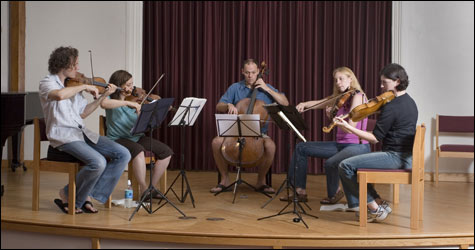
GROUP WORK: Small ensembles make for intimate listening. |
Chamber music originated in the 17th and 18th centuries for nobles and aristocrats, written by personal house composers. It is designed for small ensembles rarely exceeding 15 instruments, to be performed in small rooms and chambers. It was music of a personal nature — private entertainment — but eventually developed into a recognized ensemble category in between solo music and large-scale productions. Mozart and Haydn popularized string quartets and quintets, and the 19th and 20th centuries gave rise to the woodwind quintet.
The Portland Chamber Music Festival, a nonprofit organization since 1994, hopes to increase awareness about the rich collection of works that chamber music encompasses, with live and affordable concerts. It has always sponsored both an annual summer festival (from August 16-25 this year) and a mid-winter March prelude. As part of an overall effort to gradually expand their presence in Maine, the PCMF has been increasing its March program by one venue per year. Four concerts are being held this week — in Portland, Gardiner, Brownfield, and Lewiston, with Brownfield as this year’s addition.
In addition to increasing its geographical visibility, the PCMF is also upsizing its Portland venue — performing on Friday in the new Hannaford Hall, located at USM's Abromson Community Education Center in Portland. At a capacity of over 500, it is a large jump — almost double the capacity of their previous venue, Ludcke Auditorium at the University of New England. Jennifer Elowitch, executive director and performing violinist, hopes that its central location and free parking, as well as increased seating, will make PCMF’s performance more accessible to the general public.
The musicians for the mid-winter program include Elowitch, violinist Gabriela Diaz, violist Carol Rodland, cellist Andrew Mark, and pianist Dena Levine, adding soprano Lisa Saffer only at the Brownfield show. The program for each performance includes a piano quartet by Gustav Mahler, the American string quartet by Antonin Dvorak, and a work by Maine composer and Bates College music professor William Matthews, A Book of Hours.
A Book of Hours for violin, cello, and piano is a cycle of six pieces that infuses traditionally religious times of the day with jazz influences. The first movement, “Catbird Matins,” honors a loud catbird that woke Matthews up early (4 am) every day one summer. The last movement, “le Tombeau de Monk,” pays tribute to Thelonious Monk. Among the middle movements are “Morning Song,” “Evensong,” and “Friday Night Fishfry (Uneven Song).”
The performance of Matthews piece is indicative of another upsizing within the PCMF — a commitment to the performance of contemporary compositions. This year, they are sponsoring the second of an annual composition contest, in which entries are received from around the world, the winner receiving a world-premier performance at the summer festival. Last year’s winner was Shattering the Ethereal Resonance by Canadian composer Vincent Ho.
After sponsoring more than seventy concerts, performers from around the world, and receiving a grant from the Aaron Copland Fund for Music for their “contribution to furthering public interest and appreciation of contemporary American music,” the PCMF continues its upsizing even further — with a featured profile in this month’s issue of Chamber Music, a national publication.